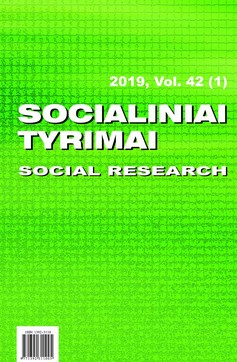LR vietos savivaldos teisinio reguliavimo problematika tarybos mažumos teisių ir demokratijos užtikrinimo aspektu
The Problematicity of Legal Regulations of Local Self-Governance in the Republic of Lithuania in the Context of Ensuring Minority Rights and Democracy
Author(s): Karolis KaklysSubject(s): Constitutional Law, Human Rights and Humanitarian Law, Governance, Public Administration, Ethnic Minorities Studies
Published by: Vilniaus Universiteto Leidykla
Keywords: minority; opposition; majority; rights; democracy; self-governance; municipal councils;
Summary/Abstract: The state governance model is established by Constitution. In the Constitution of the Republic of Lithuania, there is a separate section dedicated to local self-governance and its management, that shows not only the state’s recognition of local self-governance, but also the principles of local self-governance mentioned in the Constitution of the Republic of Lithuania. There are sixty separate territorial administrative units in Lithuania, which are guaranteed the right of self-governance, which is implemented by municipal councils elected during secret elections. After the first direct elections of mayors held on March 1, 2015, even in sixteen municipalities (Birštonas municipality, Druskininkai municipality, Ignalina district municipality, Jonava district municipality, Kaunas district municipality, Lazdijai district municipality, Marijampolė municipality, Neringa municipality, Pagėgiai municipality, Palanga municipality, Pasvalys district municipality, Rietavas municipality, Šakiai municipality, Šalčininkai municipality, Vilkaviškis district municipality, Vilnius district municipality) one of the political parties or political organizations (movements) in the municipalities and districts of Lithuania won an absolute majority, which further emphasizes the importance of securing the rights of the minority (opposition).The Constitutional Court of the Republic of Lithuania has also noted that taking into account the fact that the Constitution of the Republic of Lithuania implies the defense of the parliamentary minority, the minimum requirements for the protection of the opposition of the Lithuanian parliament, as well as the fact that the recognition of parliamentary opposition is an essential element of pluralistic democracy. The Statute of the Lithuanian parliament (Seimas) may establish guarantees of opposition activities: certain places and positions in the committee, opposition leader status, initiation of work places and commissions, etc. The systematic appraisal of the provisions of the Law on Local Self-Government of the Republic of Lithuania shows that the obligation to form in each municipality the Control Committee, the Anti-Corruption and Ethics commissions, whose candidacy is delegated by the municipal council’s opposition, is one of the ways provided by the legislator to ensure the minority rights recognized in pluralistic democracy in self-governance. As there are 60 separate territorial administrative units (municipalities) in the Republic of Lithuania, in which there is a different demographic and political situation, different regulation of municipal councils, composition of municipal councils, therefore different management traditions are formed in them. In the absence of a sufficient definition of minority rights of municipal councils, which ensure the possibilities of opposition activities, the medium develops into oligarchic tendencies. The poor control of decisions taken by municipal councils and administrative actions as well as a flawed legislative framework make it possible to form situations in which the democratic values and the protection of individual rights and freedoms are threatened. The abundance of the problems of the legal regulation of municipalities is indicated by the fact that since 1994, the Law on Local Self-Government of the Republic of Lithuania has been amended even 124 times. In the Constitution of the Republic of Lithuania (25th October 1992), a separate section is devoted to local selfgovernance and its management. This is understood as the importance given by the state to self-governance, as an independent state of governance, which unconditionally depends on legal regulation. Therefore, this article overviews the gaps in the legal regulation and the political problems that affect the principles of democracy and the system of leverage and balance between the majority of municipal councils and minorities in the local self-governance of the Republic of Lithuania.
Journal: Socialiniai tyrimai
- Issue Year: 42/2019
- Issue No: 1
- Page Range: 41-49
- Page Count: 9
- Language: Lithuanian

